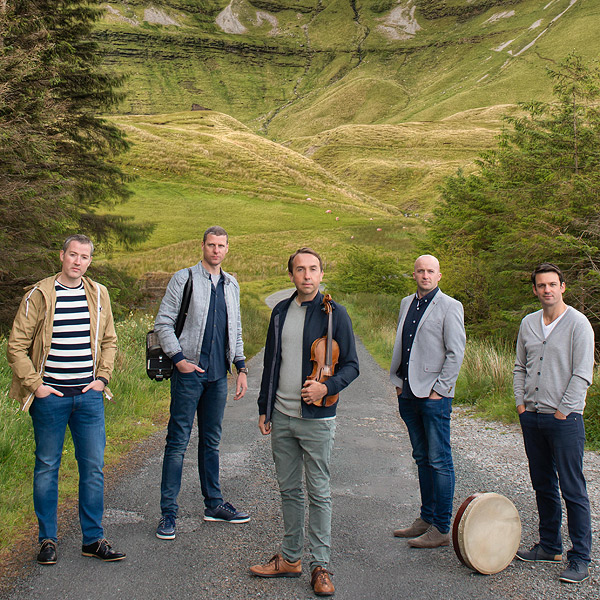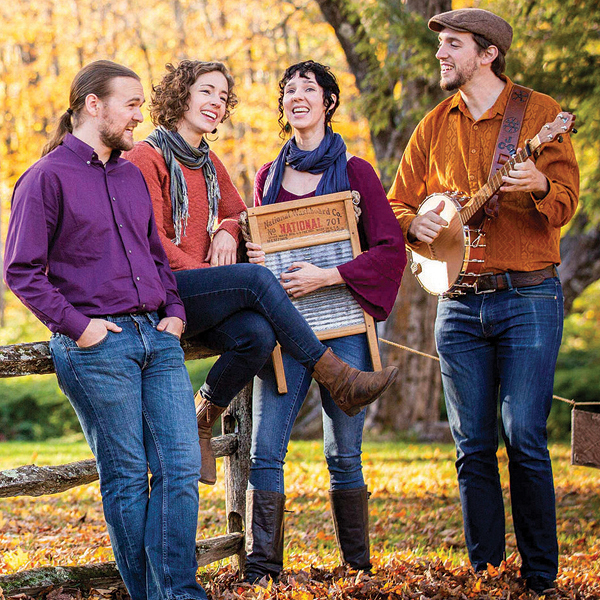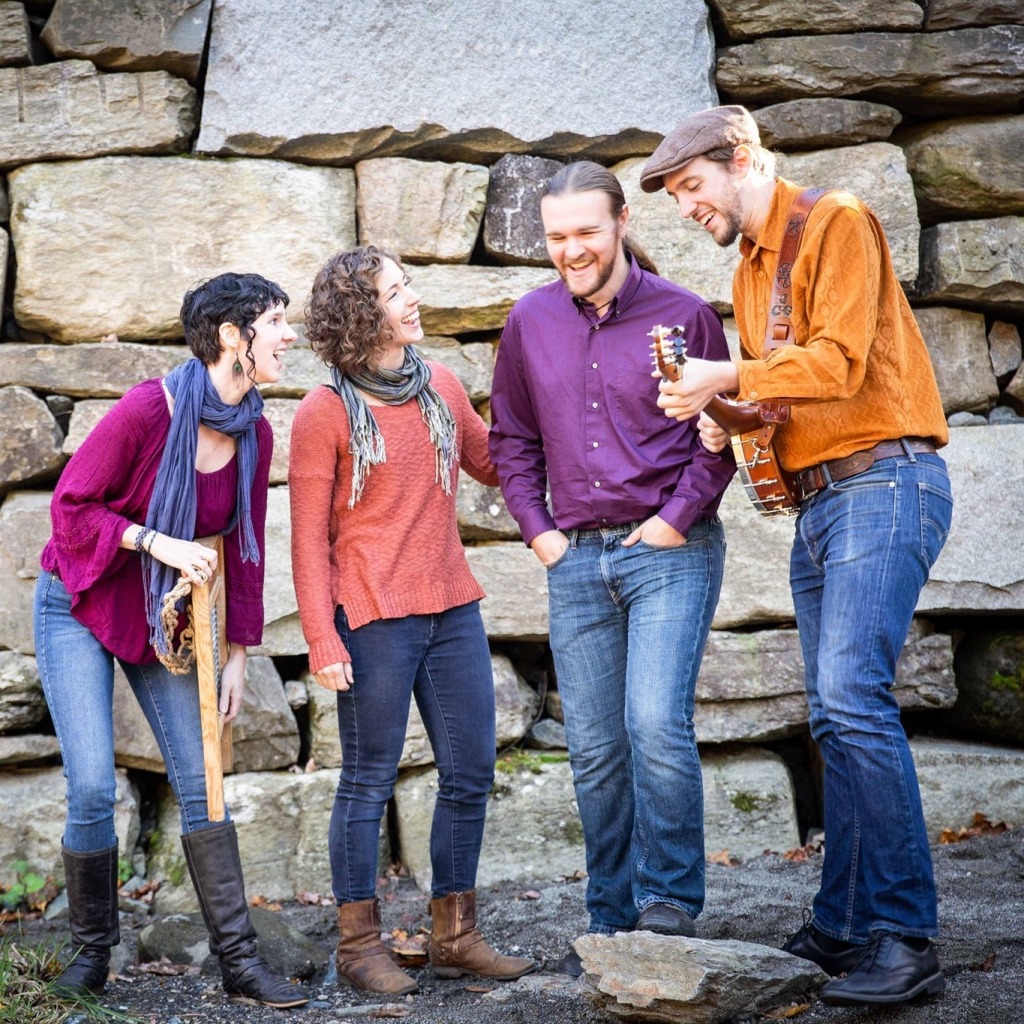The celebrated band from Ireland, Téada, will be bringing a host of energetic traditional Irish tunes and songs to The Studio, Appell Center for the Performing Arts in York on Sunday, March 6th in an event sponsored by the Susquehanna Folk Music Society. More information and official SFMS Covid Safety Policies can be found on the Susquehanna Folk Music Society website. Tickets for the concert are $24 General Admission, $20 for SFMS Members, and $10 for students (ages 3-22). Tickets will be available at the door or online.
Téada is a renowned band from Ireland that has been playing and recording albums for 21 years. Téada was founded in 2001 by Sligo fiddler Oisín Mac Diarmada along with button accordion player Paul Finn. They’re joined by Seán Gavin on flute and uilleann pipes and Patrick Doocey on guitar. This acclaimed band has toured the world and has played at prominent festivals including Milwaukee Irish Fest, Edmonton Folk Festival, Temple Bar TradFest, Shetland Folk Festival, the Rainforest World Music Festival, and many others. In 2014, the band performed to 40,000 people during an extensive 7-week tour of Japan and Taiwan. This spring, Téada will be releasing their sixth album. SFMS Staff Writer Mary-Grace Autumn Lee had the chance to chat with Téada’s fiddle player, Oisín Mac Diarmada about touring, recording, and stories the band has gathered along the way.
______________________________________________________
How did Téada first come about?
Téada is 21 years on the road this year and time sure flies when you are having fun! The band grew out of an album project I was asked to do back in 2000 which included some of my great musical friends. There was no grand plan to start a band and tour the world, but momentum grew from the recording and subsequent gigs and the project had evolved into Téada by 2001. Initially the band had a string focus in terms of instrumentation – hence the band name which translates from Irish (Gaelic) as ‘strings’. America has always been a huge part of the heartbeat of Téada, providing us with great support and encouragement since our debut tour in June 2001, and we are always thrilled to return, albeit with a few more grey hairs then we had back at the beginning!
Téada has performed around the world at many acclaimed festivals. What are some things you have experienced from traveling to different countries and performing for people of different cultures?
Sharing your culture with people around the world is a really great privilege, which I become even more aware of as time passes. There is such a welcome in so many parts of the world for Irish culture and we are blessed that people without a direct connection to Ireland can feel such affection for our music, song and dance. It is definitely one of the most fulfilling aspects of what we do as a profession, to be able to connect with people from such a variety of places and get a glimpse into their cultures and life experiences. One of the highlights for me was a 7-week Téada tour of Japan & Taiwan 2014, which was eye-opening in terms of getting to experience such a different culture to our own.
Téada is releasing their sixth album this coming spring. Would you mind sharing a little bit of the process of creating the album? How does the band collect and arrange tunes?
Our new album – Coiscéim Coiligh (As The Days Brighten) – will be released very shortly on Gael Linn Records. The title is an old Irish (Gaelic) phrase which translates literally as The Rooster’s Footsteps, but is suggestive of the onset of brighter days. Like a lot of projects, this recording process was interrupted by the Pandemic, which delayed the release timeframe from 2020 to 2022. It seems like now is a nice time to be releasing the album, as we get back on our feet again as a society with an optimism that brighter times are ahead. Going back to the actual process of creating our albums, they tend to take shape when we reach the stage of yearning for some exciting new material to add to our live set! Then the gathering of material begins in earnest and over time and of course a number of rehearsals in various parts of Ireland (since we are scattered around the country in terms of our locations!), things start to digest and new selections emerge. When it comes to choosing material to record, we tend to favour unusual repertoire, which may be unearthed from older archival recordings or indeed recently composed within the tradition.
Téada is known for taking rare tunes from the tradition and re-energising them to keep them relevant today. How does the band approach these tunes to keep them alive?
There’s something really special about coming across a rarely-heard older tune. It’s like a glimpse into another time, and more often than not, these tunes have unusual motifs or melodic ideas which you don’t typically hear played nowadays. It’s exciting to keep renewing the well of repertoire within traditional Irish music, whether through new compositions or bringing back forgotten tunes from the past!
Susquehanna Folk has many members who are Irish music appreciators and/or musicians learning Irish music. What are some of the most important tips you share to musicians learning how to play Irish music?
If you haven’t yet started on the road of learning to play Irish music, it’s never too late to start! There are so many resources out there nowadays for players of all levels, which can stimulate you to improve your skills. Learning this music, like any craft, is a journey so it’s important to try to get enjoyment from the journey! Enjoy the small steps of development rather than overly focussing on gaining proficiency quickly. Listening is as important as the active playing part.
Téada is getting ready to hit the road to go on a spring tour. What are a few things you are looking forward to?
Touring is a great privilege for those of us who enjoy it! There’s always a sense of expectancy heading out on tour and no two tours are the same. I’m looking forward to playing music with musicians I admire, soaking up all the visual stimulation that travel brings and hopefully bringing some enjoyment to other peoples’ lives. When it comes together for performers and audience, it is a very special connection and occasion!
Téada will be performing live on March 6th, 2022 at The Studio, Appell Center for the Performing Arts in York . For more information about tickets and concert safety policies, please visit the Susquehanna Folk Music website.
______________________________________________________
Mary-Grace Autumn Lee is a Harrisburg area musician. You can find her on instagram @thatdulcimergirl, her youtube channel, and her official site. Mary-Grace also plays with the Celtic/Americana band Seasons.



